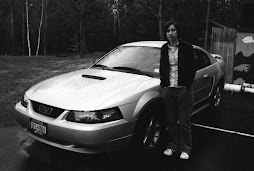A continuation in the series of book reviews of what I am reading in February.
Today: Breaking Back by James Blake.
For tennis fans, the names James Blake is a fairly familiar one. He's an American pro who's been on the circuit for around eight years who is best known for breaking his neck against a net post in 2005 then recovering and playing some great matches, especially against Rafael Nadal and Andre Agassi.
While that in itself is a great story, most people don't know the extent of the situation. And in his book, Blake (without ever promoting himself) tells what was going on behind the scenes of what was for him an extremely difficult year.
The neck thing was just the beginning. Blake's father also died that year, and when dealing with the stress, Blake contracted the zoster virus, which is basically a flare-up of shingles that in his case paralyzed parts of his body.
The emotional, physical, and mental journey proved to be a learning experience, and Blake found a new appreciation for life, friends, and tennis. As he came out of the horrid year and moved back into peak form, Blake saw how much his story encouraged others, and the book was spawned.
But this is no ordinary athlete book. This is not a Shaquille O'Neal-in-1998 look at a guy and his career.
This book is a work of art.
With any sport, you're going to have to deal with numbers and events and explanatory measures, but this book has found a way to do without letting it dominate what is a compelling narrative. (Note: Blake did have a co-author.)
The approach is thought-out: The book finds a way to take the theme of the story and weave it in with the event-telling. There are few blow-by-blow accounts of matches, and the tennis terms are relegated to glossary in the back for those unfamiliar.
The book doesn't just explain what happened over the years for Blake; it shows it, hooking the storyline into the larger theme of life and tennis in an easy, enjoyable way. We see what Blake looked like as half his face drooped from the zoster virus, and we can picture his dad wasting away with cancer. Then, mixed in, we get an analogy that helps us understand how Blake's lessons constantly grew out of the battle he had with tennis that year.
Artistically, the book does "tennis as a metaphor for life," such as the idea of "breaking back," which is not only a pivotal move of pointed resurgence in tennis but also what Blake had to do constantly in his year of struggle. You can see how the understanding of the game of tennis helped Blake handle his personal live, and vice versa.
The telling is good (not Agassi good, but sports-book-good), but the actual story is remarkable as well, of course. The authors should be credited for taking a hugely emotional story and not dwelling on it too much. There's no overkill here. You get the story, the effect, the lessons without ever feeling pulled along.
Whether a tennis fan or a fan of life, this is a must-read.
2.16.2010
February book reviews, part 4
Labels:
andre agassi,
breaking back,
james blake,
rafael nadal,
shaquille o'neal,
tennis,
zoster
Subscribe to:
Post Comments (Atom)


No comments:
Post a Comment